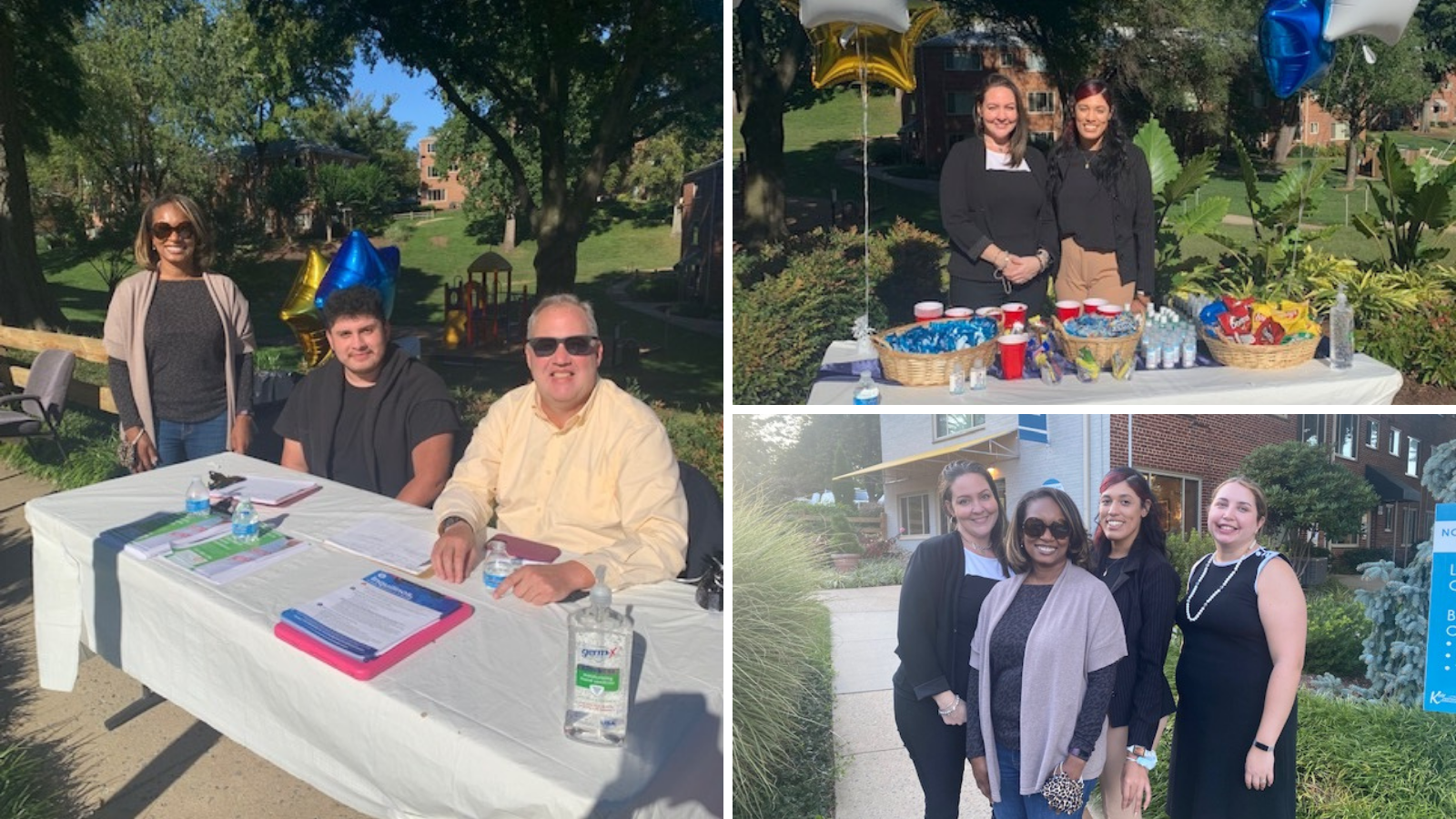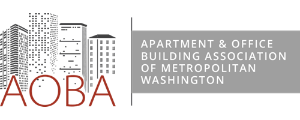Maryland At Issue - October 2021
State
AOBA Represented on the Access to Counsel in Evictions Task Force
The Access to Counsel in Evictions Task Force was created during the 2021 legislative session by House Bill 18. The task force is responsible for evaluating the services provided in the Access to Counsel program, identifying potential funding sources for the program and making recommendations to improve the program. AOBA is pleased to be represented by Luke Lanciano, Vice-Chair of Maryland’s Legislative Affairs Committee and Compliance Administrator with Bernstein Management Corporation.
The passage of HB 18 made the Maryland General Assembly the second state legislature in the country to provide statewide access to counsel in eviction proceedings for income-eligible tenants. AOBA did not oppose the bill but cautioned the General Assembly against funding the program via additional fees on rental housing providers and ensuring that there was industry representation on the task force.
The task force held its first meeting on September 20 and will meet again on October 7. It must issue an annual report with its findings and recommendations to the Governor and the General Assembly, the first of which is due on January 1, 2022.
MEMBER ACTION: If you have questions or concerns, please contact Erin Bradley.
UPDATE on Emergency Rental Assistance and Eviction Date
On Sept. 30, the Maryland Department of Housing and Community Development (DHCD) announced the Emergency Rental Assistance Program has approved $135 million to assist 15,000 renters affected by the COVID-19 pandemic. That $135 million includes $65.7 million in state program spending and $69.4 million in relief provided by local jurisdictions that received direct federal funding. Six counties—Carroll, Cecil, Frederick, Howard, Prince George’s and Wicomico—have utilized at least 50 percent of their allocated resources. In addition to previously allocated funds, DHCD reserved $20 million to reallocate based on successful program implementation. The state will begin allocating those funds to the fastest-spending counties in October.
Additionally, the District Court of Maryland reports the majority of failure-to-pay rent cases were dismissed, with under 800 evictions occurring monthly—compared to an average of 1,800 in the 6 months prior to the pandemic.
State Government Ends Fiscal Year with Billions in Surplus
Maryland state government ended the 2021 Fiscal Year with $2.5 billion in surplus, with COVID-19 related federal aid accounting for most of the excess funds. This surplus is significantly larger than the 2020 surplus of $585 million. When discussing the state’s fiscal situation, Governor Hogan stated that he will prioritize “relief that advances our recovery." We will learn more about his plans and the financial forecast in the coming weeks.
The State fiscal year runs from July 1 to June 30.
'
New Annapolis Office for Team Maryland
After 40 years serving AOBA out of the 86 State Circle office, Team Maryland recently moved into a new office located on 150 South Street in Annapolis. If you have any questions, please contact Erin Bradley and Ryan Washington. Please continue to call the Maryland team on their cell phones, but they can also be reached at their new office phone numbers: Erin at (410) 424-0237 and Ryan at (410) 424-0248.
WSSC Water is Seeking Public Comment on Proposed Changes to the WSSC Water Plumbing and Fuel Gas Code
WSSC Water is proposing amendments to the International Plumbing Code (IPC) to adopt the 2021 IPC and the 2021 International Fuel Gas Code and make some technical and administrative modifications to the 2018 WSSC Plumbing and Fuel Gas Code. The proposed changes have been preliminarily reviewed by the WSSC Water Plumbing and Fuel Gas Board and are being released for public comment. The proposed changes are being coordinated with interested stakeholders, including building/trade associations and county officials. To view the public notice, you may visit the WSSC Water website at: WSSC Water is Seeking Public Comment on Proposed Changes to the WSSC Plumbing and Fuel Gas Code. WSSC Water intends to adopt these new regulations following a public comment period. Written comments will be accepted until October 26, 2021.
MEMBER ACTION/NEXT STEPS: Members should review the proposed changes and contact Ryan Washington with any comments or questions by October 19. AOBA will review the comments to determine if there are member issues that should be addressed in AOBA comments filed on or before the October 26 deadline.
2033 Sprinkler Mandate for Un-Sprinklered Residential High-Rise Buildings
In 2019, the State Fire Prevention Commission approved a measure to certify that high-rise residential buildings that lack sprinklers are a hazard to public safety, life, and property. Following that decision, the State Fire Marshall issued a state-wide mandate that existing high-rise buildings be retrofitted with sprinklers that provide a sufficient level of fire safely by 2033.
County implementation/guidance: AOBA is in communication with Prince George’s County regarding their process for implementing the state mandate. Montgomery County building owners must comply with the state mandate and locally adopted amendments. AOBA is working with the Montgomery County Department of Permitting Services (DPS) regarding the implementation, but in the interim members can review DPS-issued guidance below. AOBA staff will contact members with updates on implementation and to solicit feedback on these policy changes.
Montgomery County: DPS recently issued a notice to building owners outlining four compliance options for existing un-sprinklered high-rise buildings. Building owners must consult a qualified design professional to assist with the compliance process, including selecting the appropriate compliance option. Members should review the DPS documents below.
- DPS Administrative Interpretation/Policy for Unsprinklered High Rise Buildings
- Sprinkler Program Registration (Google Form): To begin the agreement process and ensure that building owners have the maximum amount of time for compliance, building owners are required to submit information regarding building ownership in the Google Form.
- DPS Life Safety Agreement: For any compliance option, a Life Safety Agreement (LSA) is available. The LSA is a multi-year contract to allow phasing of fire protection systems installations. It can be downloaded, completed and returned to DPS for review, discussion and approval. Questions regarding this document may be directed to Patsy Warnick at pastora.warnick@montgomerycountymd.gov.
Montgomery County
PHED Gives Preliminary Approval to Jawando’s Rent Control Bill
Current law, Montgomery County Landlord-Tenant Relations – Rent Stabilization During Emergencies, limits rent increases to the Voluntary Rent Guidelines currently set at 1.4% through November 15. Councilmember Jawando's latest rent control bill, Expedited Bill 30-21, Landlord-Tennant Relations – Restrictions During Emergencies – Extended Limitations, proposes to extend the restrictions on allowable rent increases and impose a new ban on late fees for one year after the expiration of the public health emergency. AOBA testified at the September 14 public hearing and staff and members participated in the September 20 PHED work session. At the work session, the PHED committee debated two amendments from Councilmembers Andrew Friedson and Hans Riemer. The Riemer amendment as introduced proposed limiting application of the late fee ban to tenants who have used “best efforts” to obtain available rental assistance and suffered a hardship directly or indirectly related to COVID. The Friedson amendment proposed using language from the Prince George’s County law to limit application of the rent increase cap and imposition of the late fee ban where a tenant has experienced a substantial loss of income and is unable to make rent payments as a direct or indirect result of the COVD-19 pandemic.
Due to concerns expressed by AOBA, the PHED ultimately adopted a version of Riemer’s amendment that will be tied to the eligibility standards under the county’s COVID Rent Relief Program (CRRP).
NEXT STEPS: AOBA will update members on developments as discussions continue on the legislative proposal especially language to narrow the application of the cap on allowable rent increases. Members with questions or concerns should contact Nicola Whiteman.
Kay Management Hosts HHS, LEDC and Renter’s Alliance at COVID-Rent Relief Program
 Kay Management team members hosted the Montgomery County Department of Health and Human Services, Latino Economic Development Corporation, Montgomery County Renters Alliance and AOBA staff for a COVID Rent Relief Program outreach event at a Silver Spring rental community. Participants answered resident questions and provided information about participating in the COVID Rent Relief Program. Thank you Kay Management for your efforts to help ensure residents receive much-needed rental assistance.
Kay Management team members hosted the Montgomery County Department of Health and Human Services, Latino Economic Development Corporation, Montgomery County Renters Alliance and AOBA staff for a COVID Rent Relief Program outreach event at a Silver Spring rental community. Participants answered resident questions and provided information about participating in the COVID Rent Relief Program. Thank you Kay Management for your efforts to help ensure residents receive much-needed rental assistance.
Prince George's County
Prince George's County Council Hearing on CB-61-2021
On Thursday, September 30, the Committee of the Whole passed CB 61-2021- Building Code of Prince George's County Amendment to Increase Civil Fines out of committee and will be voted on by the Council in coming weeks. The bill was proposed by the Department of Permitting, Inspections, and Enforcement and seeks to increase the civil fines imposed through an administrative citation for building code violations. Currently, county officials are authorized to serve a notice of violation to any individual responsible for the erection, construction, alteration, extension, repair, moving, removal, demolition, or occupancy of a building that violates the 2018 International Building Code (IBC). This legislation seeks to increase the fine from $500 to $1,000 per violation and requires the fine be paid within 30 days after the citation is issued. Additionally, an individual can be found guilty of a misdemeanor if they, or parties on their behalf, violate any provisions of a Stop Work Order. This bill applies to all commercial and residential property owners in the County. AOBA sent recommendations to the Council to improve the language in the bill regarding the written notice requirement and to allow DPIE to send correspondence to a registered agent.
MEMBER ACTION: For more information, please contact Ryan Washington at (202) 770-7713.
Legislation Introduced to Extend COVID-19 Related Tenant Protections
On Tuesday, Sept. 14, Councilmember Ivey introduced CB-70-21, a legislative proposal to extend the county’s temporary renter protections for one year following the termination of Governor Hogan’s COVID-19 State of Emergency (August 15, 2022). Current law, CB-16-20, which the Council enacted in June 2020, prohibits rent increases for residents who demonstrate a substantial loss of income related to the COVID-19 pandemic. The law also prohibits late fees on all County residents. These landlord-tenant requirements were scheduled to sunset on November 15, 2021, 90 days after the state of emergency expired.
Following the enactment of CB-16-20, the Council passed CB-78-20 in December 2020, which placed a temporary 2.6% cap on all allowable rent increases in the County. The pending legislation, CB-70-21, would extend these landlord-tenant requirements for one year after the termination of the Governor's State of Emergency.
AOBA submitted a position statement emphasizing the need for targeting these protections to residents that could demonstrate a substantial loss of income. A blanket cap on rent increases is tantamount to rent control and places undue hardship on housing providers. AOBA staff anticipates working with the bill sponsor to tailor the legislation prior to the Committee work session.
MEMBER ACTION: If you have questions, please contact Erin Bradley at (301) 904-0814.
